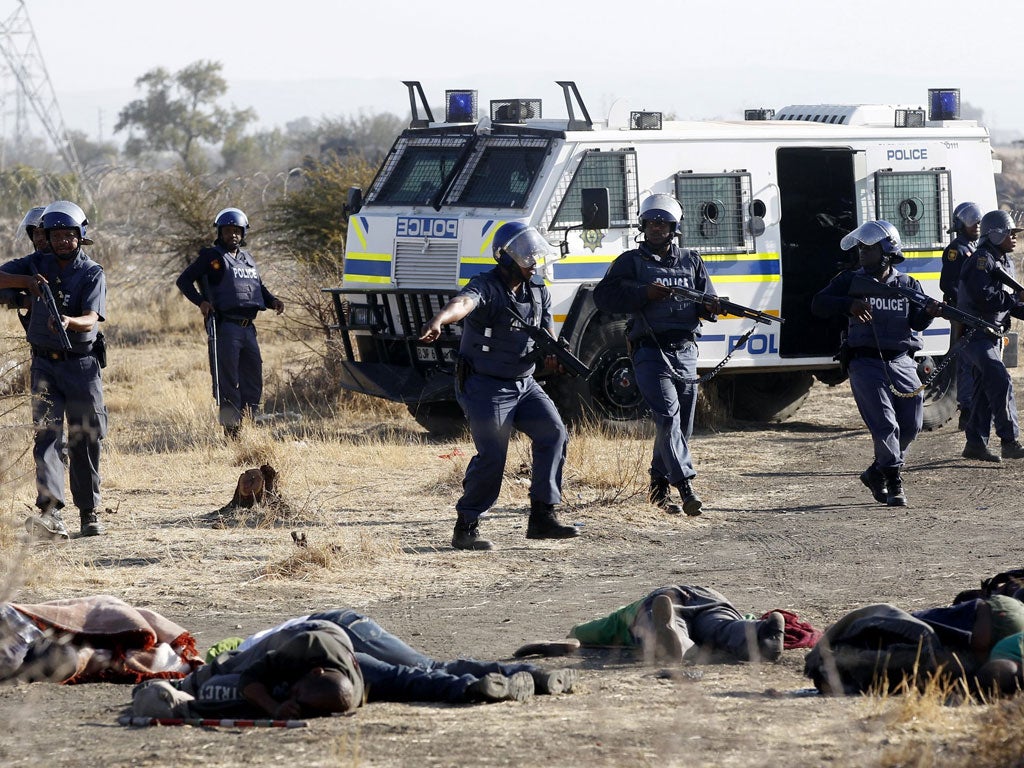South African police slaughter striking miners after stand-off
18 dead at British-owned platinum mine as authorities lose patience with rival factions in industrial dispute

A South African platinum mine turned into something akin to a war zone yesterday when an attempt by riot police to break up a week-old dispute by workers resulted in the deaths of up to 18 people.
Fighting between miners from rival unions had already claimed 10 lives over the past week near the Marikana mine near Rustenburg, about 100 kilometres northwest of Johannesburg. Two of those killed were police officers who were hacked to death on Monday.
The leaders of two trade unions at Marikana – the National Union of Mineworkers (NUM), which has been dominant at the mine for 30 years, and the Association of Mining and Construction Union (Amcu) – blamed the London-listed mine owner Lonmin for the trouble.
Lesiba Seshoka, an NUM spokesman, said that the company had attempted to break the NUM's dominance by granting a pay rise to a small group of rock drillers. "The company undermined the bargaining process by unilaterally offering an allowance to rock-drill operators outside the bargaining process," he said.
Amcu's general secretary, Jeffrey Mphahlele, claimed the violence started when NUM members shot at his members last week. But Mr Mphahlele also blamed the FTSE 100-listed company for the trouble, and cited the failure to follow established bargaining protocol. He admitted there was rivalry between the two unions but said: "It was the blunder of the company to negotiate with individual people outside of union structures that [worsened] the situation. Those people who were negotiated with are now holding ground and making high demands."
In statement issued last night, Lonmin's chairman, Roger Phillimore, said: "We are treating the developments around police operations this afternoon with the utmost seriousness. The South African Police Service have been in charge of public order and safety on the ground since the violence between competing labour factions erupted over the weekend, claiming the lives of eight of our employees and two police officers.
"It goes without saying that we deeply regret the further loss of life in what is clearly a public order rather than a labour relations associated matter."
The company's shares slipped by 7 per cent after it announced the disruption would dent its profits this year.
Yesterday's violence happened after the arrival on Wednesday of 3,000 police, including a riot control unit dressed in camouflage and backed by two helicopters and horses. According to a police spokesman, Captain Dennis Adriao, police had tried on Wednesday to "talk the Amcu rock-drillers off the hill" but when those efforts failed, they stormed the encampment yesterday using a water canon and tear gas.
The workers fought back with clubs, machetes and petrol bombs, he said. There was a three-minute exchange of gunfire but there were conflicting reports on whether the live bullets were fired by the police or by demonstrators. South African police generally use rubber bullets when trying to control crowds. South Africa has one of the most unionised work forces in the world and the 330,000-strong NUM , the biggest affiliate of the Congress of South Africa Trade Unions (Cosatu), is one of the most influential partners in the South African government.
Union rivalry is playing out in national politics in the run-up to December's leadership battle for the African National Congress. The NUM is struggling against the country's metalworkers' union, NUMSA, to remain the dominant policy force in Cosatu. If the NUM loses the upper hand, the more hardline metalworkers will gain sway and have greater influence in the choice of the ANC's leadership.
South African platinum mines have been marked by violence since the beginning of the year when drillers at Impala Platinum closed down their mine for six weeks. They only agreed to go back to work after the management more than doubled their monthly salaries.
Resource rich: South Africa's mines
South Africa is one of the most resource-rich countries in the world with a mining industry that dates back to the discovery of a diamond on the banks of the Orange River in 1867. Today, the country is the world's largest producer of chrome, manganese, platinum, vanadium and vermiculite and the second-largest producer of gold, palladium, rutile and zirconium. It is also the world's third-largest exporter of coal.
It employs about a million people and accounts for about a fifth of the South Africa's economy, generating 298.2bn rand (£23 bn) last year. Platinum contributed 73.8bn rand of that total.
Tom Bawden
Subscribe to Independent Premium to bookmark this article
Want to bookmark your favourite articles and stories to read or reference later? Start your Independent Premium subscription today.

Join our commenting forum
Join thought-provoking conversations, follow other Independent readers and see their replies